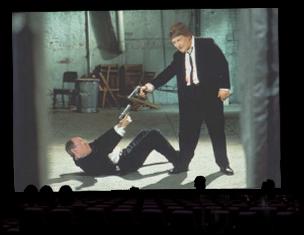Lyndon Hood: Parliament Imitates Art
Satire: Parliament Imitates Art
by Lyndon Hood

The wild speculation of history's great creative minds has, I've often thought, rarely been able to match the droll and improbable events that occur in the politics of this nation.
But recently a rash of occurrences in the life of Parliament had a particularly strong resemblance to the works of moving-picture artists.
Even if we limit ourselves to the cinema - thus excluding comparison between G.B.H. (the 1991 TV series in which an up-and-coming politician persecutes a school headmaster for arbitrary, deeply psychological reasons) and Allan Peachey - the similarities are staggering:
In
Die Hard (1988)
As snow falls outside, Bruce
Willis tries to warn the authorities of a massive kidnapping
plan. Government agents turn off the power, inadvertently
allow a staggeringly large amount of money to be
stolen.
In Parliament:
Snow falls in Canterbury.
Opposition digs up old warnings as power goes off in
Auckland, costing the economy a staggeringly large amount of
money.
In Gremlins (1984)
Cute furry
animals turn into monsters when fed after midnight.
In
Parliament:
Docile Pacific nations vote for whaling
after receiving Japanese money.
In Invasion of
the Body Snatchers (1956)
On kissing Dana Wynter,
Kevin McCarthy realises she's actually a pod person.
In
Parliament:
Pita Sharples declines to support second
reading of 90-day probation employment bill.
In
A Boy and His Dog (1975)
Post-apocalypse:
After all his troubles, Don Johnson still has his
dog.
In Parliament:
Pre-interview, annoyed about
coverage of tax issues, Michael Cullen suddenly has a
cow.
In The Passion of the Christ
(2004)
Messiah is crucified without particularly
deserving it. In a not wholly unexpected move, he rises
three days later.
In Parliament:
David Parker
resigns.
In Interview With a Vampire
(1994)
Louis de Pointe du Lac, who one would
reasonably have expected to die in the 18th Century,
discusses his life and opinions.
In
Parliament:
Don Brash, still leader of the National
Party, plans his next Orewa speech.
In Soylent
Green (1973):
Mystery food ingredient is
"people".
In Parliament:
People on hospital
waiting lists are "culled".
In K-9000
(1991)
Scientist develops a prototype electronic
police dog. A hilarious mix-up sees a microchip implant
telepathically connecting dog to a less intelligent
human.
In Parliament:
Parliament debates
unpopular dog microchip implant law. Pragmatic
considerations see several Green MPs voting with United
Future.
In The Cabinet of Dr Caligari
(1920)
Protagonist is either the only one who can
protect the innocent from a horrible fate, or a
psychotic.
In Parliament:
"No room for more tax
cuts" - Cullen
In Rambo III
(1988)
One soldier combats the forces of oppression
in a nation controlled by totalitarian communists.
In
Parliament:
Heather Roy returns to the
House.
In Wall Street (1987)
Charlie
Sheen wins riches, looses soul.
In
Parliament:
United Future wins chipping debate,
didn't have any friends anyway.
In Beneath the
Planet of the Apes (1970)
Due to actions of
talking apes, man destroys whole planet.
In
Parliament:
Citing actions of Bush administration,
National still intends to withdraw from Kyoto.
In
Monsters, Inc. (2001)
A legion of nightmare
creatures try to use the terror of children as a power
source. Hilarity ensues.
In Parliament:
Murray
McCully compares NZ anti-terror legislation unfavourably
with Australia's.
In The Fugitive
(1993)
Tommy Lee Jones hunts Harrison Ford, who is
charged with a crime he didn't commit.
In
Parliament
Ron Mark wants Kahui family arrested for
not talking to the police, which is not a crime.
In
Bride and Prejudice (2004):
Jane Austen is
suddenly full of bollywood dance sequences. Martin Henderson looses the arrogance and, after a series of fractious
but increasingly flirtatious encounters, picks up Aishwarya Rai.
In Parliament:
Dancing with the Stars is
full of Rodney Hide. He looses weight and, after a series of
increasingly inexplicable txt-election results, drops
Krystal.
In The Sixth Sense
(1999)
Haley Joel Osment sees dead people. Bruce
Willis helps.
In Parliament:
Uncooperative
family of dead twins sees enraged nation (which doesn't
improve the situation, but nation feels better). Pita
Sharples somehow imagines he can help. At the end, we
discover Sharples is also enraged.
So, now you've seen
the facts!
Coincidence - or happenstance? You be the judge!


 Binoy Kampmark: Commemorating Mummy - Reflections On Mother’s Day
Binoy Kampmark: Commemorating Mummy - Reflections On Mother’s Day Gordon Campbell: On The New Pope, And The Israeli Attack On Peter Davis
Gordon Campbell: On The New Pope, And The Israeli Attack On Peter Davis Martin LeFevre - Meditations: For The Love Of Sycamores
Martin LeFevre - Meditations: For The Love Of Sycamores Ian Powell: A Timely Call For A Social Contract In Health
Ian Powell: A Timely Call For A Social Contract In Health Binoy Kampmark: Bratty Royal - Prince Harry And Bespoke Security Protection
Binoy Kampmark: Bratty Royal - Prince Harry And Bespoke Security Protection Keith Rankin: Make Deficits Great Again - Maintaining A Pragmatic Balance
Keith Rankin: Make Deficits Great Again - Maintaining A Pragmatic Balance